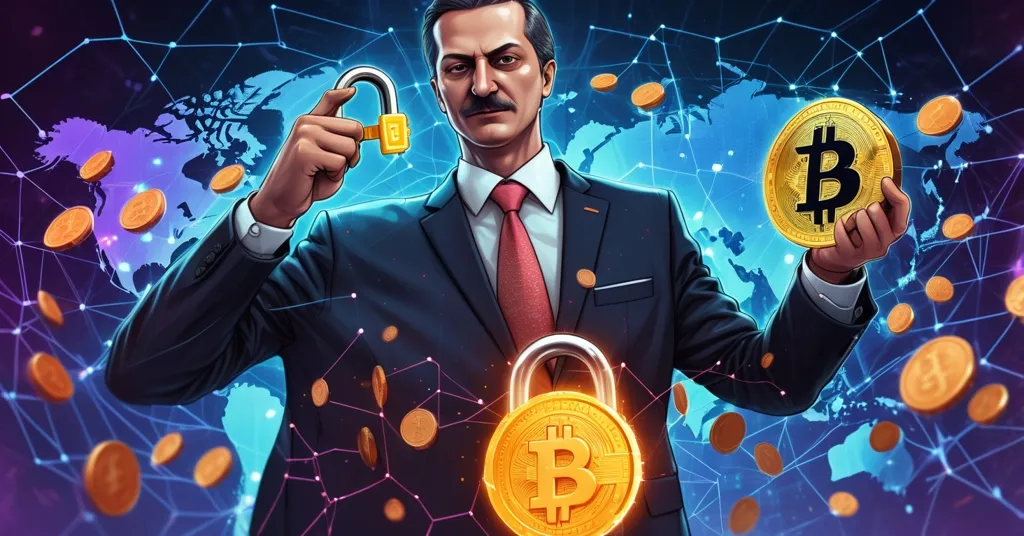Turkey’s Crypto Crackdown: Financial Watchdog Gains Power to Freeze Accounts

Turkey’s Crypto Clampdown: Financial Watchdog Gets Power to Freeze Accounts
Turkey is rolling out a hard-hitting bill that could change the game for crypto users, granting its financial watchdog, Masak, unprecedented authority to freeze and control both digital and fiat accounts. With a struggling economy and skyrocketing crypto adoption, the government is drawing a line in the sand to combat crime, but at what cost to freedom and decentralization?
- Masak’s New Muscle: Power to freeze or close crypto and fiat accounts tied to illicit activity.
- FATF Alignment: Legislation meets global anti-money laundering and terrorism financing standards.
- Economic Crisis Fuel: Turkish lira’s collapse drives crypto use, prompting stricter oversight.
Turkey’s Economic Meltdown and the Crypto Surge
The Turkish lira has been on a relentless downward spiral since 2018, hammered by inflation that peaked above 80% in 2022, effectively doubling the price of everyday goods. For many Turks, a loaf of bread or a tank of gas became a gamble against a currency losing value by the day. This economic nightmare has pushed citizens toward alternatives like Bitcoin and stablecoins—cryptocurrencies pegged to assets like the U.S. dollar to avoid wild price swings. Back in 2020, one Bitcoin was worth around 100,000 Turkish lira; today, it’s over 4.6 million lira, a staggering reflection of both Bitcoin’s rise and the lira’s fall. According to the Chainalysis Global Crypto Adoption Index released in September 2024, Turkey ranks among the world leaders in crypto uptake, with centralized exchanges and institutional services leading the charge. For a nation drowning in fiat devaluation, digital assets have become a lifeboat—but the government isn’t letting this ship sail unchecked.
Behind this surge lies desperation. Turks aren’t just dabbling in crypto for speculative gains; they’re using it to preserve what little wealth they have left. Stablecoins like USDT have become a de facto replacement for the U.S. dollar in a country where accessing foreign currency is often restricted or prohibitively expensive. Bitcoin, meanwhile, offers a decentralized escape from a banking system tainted by political interference and inflation. But with this boom comes a dark underbelly—scammers, fraudsters, and money launderers have latched onto the trend, exploiting vulnerable citizens through schemes like “rented accounts,” where individuals are paid to let criminals use their accounts for illegal gambling or fraud. It’s a sleazy tactic that preys on the desperate, and Turkey’s had enough.
Masak’s Sweeping Powers: A New Sheriff in Town
Enter Masak, Turkey’s financial crimes investigation board, established in 1996 to combat money laundering and financial misconduct. Historically focused on traditional finance, Masak is now being armed with tools to tackle the digital frontier. Under the proposed bill, set to be presented to the Grand National Assembly, Masak will gain the ability to freeze or shut down accounts—whether in banks, payment systems, e-money platforms, or crypto exchanges—if they’re linked to suspicious activity. We’re not talking minor penalties here; Masak can blacklist crypto wallets, impose transaction limits, and essentially turn off the financial tap for anyone under scrutiny. This is a full-on power grab, with a laser focus on rented accounts and other shady practices that have turned parts of the crypto space into a cesspool of crime, as detailed in recent reports on Turkey’s new financial oversight powers.
Beyond account freezes, the regulations pile on compliance burdens for crypto exchanges. Platforms operating in Turkey must now collect detailed data on every transaction, including the source of funds and the purpose behind each move. Stablecoin transfers face strict caps, and transactions above 15,000 Turkish lira (about $450 at current rates) trigger mandatory ID checks. Even cash withdrawals tied to certain activities will hit deliberate delays, as the state tightens the noose on money flows. Earlier in 2025, Turkey’s Capital Markets Board (CMB) already showed its teeth by blocking access to unauthorized platforms like PancakeSwap, a decentralized exchange built on blockchain tech that lets users swap tokens without a middleman. The CMB also mandated local registration for crypto firms, complete with rigorous anti-money laundering (AML) rules—standards meant to stop criminals from disguising illegal funds—and customer protection measures. The message is blunt: comply, or get out of Dodge.
Compliance or Control? FATF and the Global Push
Turkey’s aggressive stance isn’t just a reaction to domestic chaos; it’s a calculated move to align with international expectations. The Financial Action Task Force (FATF), a global body setting standards for combating money laundering and terrorism financing, removed Turkey from its “grey list” in June 2024—a designation for countries with inadequate financial safeguards. Getting off that list was a win for Turkey’s reputation, signaling to the world that it’s serious about cleaning up its act. But it comes with strings attached. FATF guidelines demand strict oversight of high-risk sectors like cryptocurrency, and Turkey’s latest bill is a direct response to that pressure. It’s not just about stopping crime; it’s about proving Turkey can be a trusted player on the global financial stage, potentially attracting legitimate investment amid its economic woes.
Turkey isn’t alone in this crackdown. Countries like Kazakhstan and Russia are also tightening the screws on digital assets, often under the same pretext of FATF compliance and crime prevention. Kazakhstan has ramped up taxes on crypto mining, while Russia flip-flops between bans and regulated acceptance, reflecting a broader trend among high-adoption nations. Governments worldwide are waking up to the dual nature of crypto: a revolutionary tool for financial freedom, but also a haven for illicit activity if left unchecked. Turkey’s high ranking in crypto adoption mirrors patterns in other emerging markets where fiat currencies falter—think Venezuela or Argentina—making it a test case for how regulation might play out globally. The question is whether this is a blueprint for balance or a slippery slope to overreach.
Impact on Traders and the Privacy Paradox
For Turkish crypto traders, the landscape just got a lot rockier, though trading and holding digital assets remain legal—for now. Mandatory ID checks, limits on stablecoin transfers, and the looming threat of account freezes mean every transaction carries extra scrutiny. Imagine saving up in Bitcoin to hedge against the lira’s collapse, only to have your wallet blacklisted over a vague suspicion. It’s a gut punch to the very people who turned to crypto for safety. Privacy advocates are already sounding alarms, and rightly so. Blockchain technology, at its core, offers pseudonymity—a way to transact without revealing your identity to the world. When regulators demand detailed transaction data, that foundational promise starts to crumble.
But let’s not sugarcoat the other side: the crypto space isn’t a bastion of angels. Fraud and money laundering are rampant, and Turkey’s economic desperation makes it a prime target for scammers. A 2023 report by Chainalysis noted that illicit transaction volumes globally hit $20.6 billion, with emerging markets bearing the brunt. Rented accounts are just one ugly symptom of a larger disease, preying on citizens already crushed by inflation. Masak’s heavy hand might be a necessary evil to weed out the grime, even if it risks alienating honest users. The real danger, though, is in the precedent. If account freezes and data demands become the norm, what’s stopping other nations from turning crypto into just another arm of the centralized system we’re trying to escape?
Altcoins and DeFi: Caught in the Crossfire
As a Bitcoin maximalist, I’ll always argue that BTC is the gold standard of decentralization—unmatched in security and ethos. But I can’t ignore that altcoins and other blockchains like Ethereum play vital roles in this revolution, filling niches Bitcoin wasn’t designed for. Stablecoins, often built on Ethereum or other networks, are lifelines for Turks dodging lira volatility. Decentralized finance (DeFi) platforms like PancakeSwap offer ways to earn yield or swap assets without relying on corruptible banks. Turkey’s regulations, however, don’t discriminate—they hit everything from Bitcoin to obscure altcoins with the same hammer. Limits on stablecoin transfers could choke off a key financial tool for citizens, while blocking DeFi platforms risks stifling innovation in a space that’s already outpacing traditional finance. It’s a clumsy, one-size-fits-all approach that might do more harm than good to the broader ecosystem.
Balancing Act: Protection vs. Decentralization
Here’s where I’ll play devil’s advocate: regulation isn’t inherently the enemy. A completely unchecked crypto market is a breeding ground for disaster—think ponzi schemes, rug pulls, and outright theft. Turkey has a duty to protect its people, especially when the lira’s collapse has left them vulnerable to every hustler with a wallet address. Aligning with FATF standards could stabilize Turkey’s financial image, paving the way for legitimate crypto businesses to thrive. But there’s a fine line between protection and control, and Turkey’s bill feels like a sledgehammer when a scalpel might do. Freezing accounts and tracking transactions erodes the autonomy that makes Bitcoin a middle finger to broken systems. If decentralization means anything, it’s the right to opt out of surveillance and overreach—not just swap one overseer for another.
Looking ahead, these rules could have chilling long-term effects. Will they deter innovation, pushing developers and startups to friendlier jurisdictions? Could they drive users underground to black markets, where scams are even harder to police? And what about effective accelerationism—the idea that we should push tech forward, fast, to solve systemic problems? Turkey’s clampdown risks slowing that momentum, turning a tool of disruption into a regulated relic. As a champion of freedom and privacy, I worry we’re losing sight of why crypto matters. Yes, clean up the mess, but don’t burn down the house to do it.
Key Questions and Takeaways
- What new powers will Masak gain over crypto accounts in Turkey?
Masak will be able to freeze or close accounts, set transaction limits, and blacklist wallets suspected of illicit activity across crypto and fiat platforms. - Why is Turkey enforcing stricter crypto regulations now?
It’s driven by FATF compliance, the need to combat crimes like rented accounts, and the lira’s collapse fueling massive crypto adoption. - How has the Turkish lira’s crisis boosted crypto use?
With inflation soaring and the lira losing value, Turks have embraced Bitcoin and stablecoins as hedges, ranking high in global adoption per Chainalysis data. - What does this mean for Turkish crypto traders?
Traders face ID checks, stablecoin restrictions, and potential account freezes, though they can still legally trade and hold assets. - Is Turkey’s approach part of a larger global trend?
Yes, nations like Kazakhstan and Russia are also cracking down, reflecting a worldwide push to regulate crypto while wrestling with innovation. - Will these regulations set a precedent for other high-adoption countries?
Possibly—Turkey’s moves could inspire similar heavy-handed policies in markets like Venezuela or Argentina, where crypto is also a financial escape. - Can Bitcoin remain a tool for freedom under such oversight?
It’s tough—while regulation targets crime, it risks undermining Bitcoin’s core promise of privacy and autonomy, testing the spirit of decentralization.
Turkey’s crypto clampdown is a double-edged sword, cutting at both scammers and the freedoms that define this space. As Bitcoiners, we must grapple with a hard truth: regulation might be a necessary evil to purge the filth, but it can’t come at the expense of turning crypto into another cog in the centralized machine. The lira’s collapse showed why we need decentralized alternatives, not why we should tame them. Can Turkey—and the world—strike a balance that doesn’t suffocate the revolution? That’s the million-lira question, and it’s worth far more than the answer.



